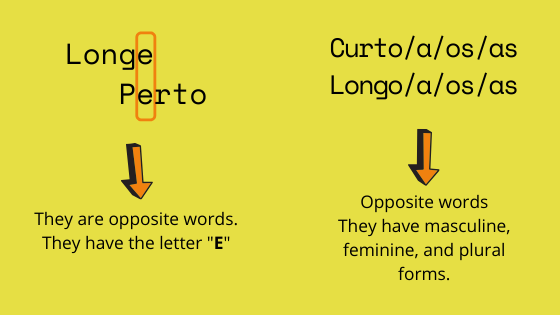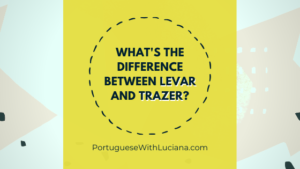Why do people confuse these two words a lot? Oh, it’s because they are almost the same… I see 😆😝
But I can’t laugh because when I learned these words in Spanish I remember they were sooo confusing! So if you also speak Spanish, I recommend you make a clear list of longe, longo and largo in Portuguese and Spanish. And be careful!
I’ll explain both words and give examples. I’ll also add an activity below so you can check your understanding. If you prefer, you can watch the video about them in Portuguese!
 Longe
Longe
Longe is about distance! And it’s the opposite of perto. These two words are adverbs, they never change, they are invariable. There is no plural or feminine for them. Examples:
- São Paulo é longe de Manaus. São Paulo é perto de Belo Horizonte.
- Eu trabalho longe de casa. São duas horas de carro para ir e duas horas para voltar.
- A padaria é longe do centro da cidade.
Longo
 Longo is about size, and it’s the opposite of curto. It’s a synonym for comprido. These three words: longo, curto and comprido are adjectives. They change! They have feminine and plural forms:
Longo is about size, and it’s the opposite of curto. It’s a synonym for comprido. These three words: longo, curto and comprido are adjectives. They change! They have feminine and plural forms:
longo, longa, longos, longas – curto, curta, curtos, curtas – comprido, comprida, compridos, compridas
Examples:
- A estrada é longa. O caminho é longo.
- Cabelo longo. Vestidos longos.
How do you remember these differences when you are speaking?
When I have to remember this kind of thing when I study a language, I create ways to relate the words to the meaning, to the way it’s written, to the way it sounds… It’s called mnemonic.
If I had to do something like that to remember longe and longo, here’s what I’d do:

Do you need practice? Here you have an activity about these words!
I hope this blog post helped you and if you want to sign up to receive this kind of material in your email, you can join my list here.
Até a próxima,
Luciana



